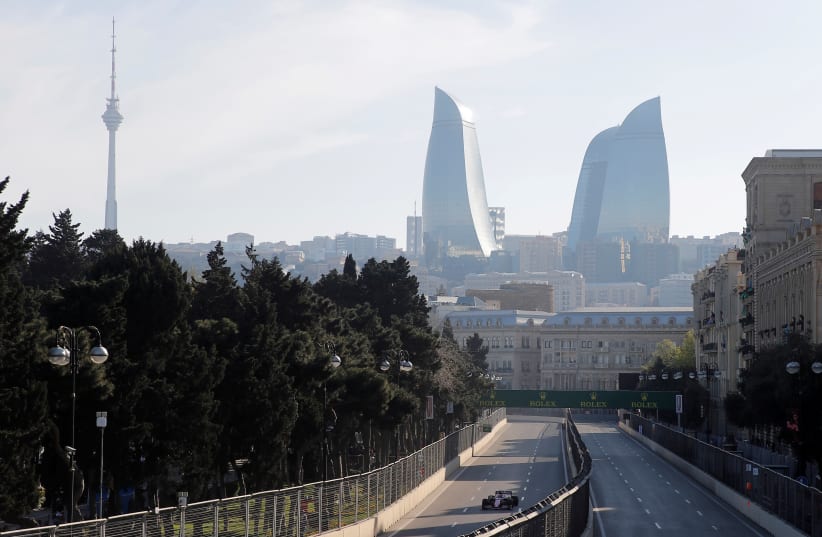Although Jewish communities were historically widespread in the world, there have been few places where they could live without a fear of persecution.Among those places is the territory of modern-day Azerbaijan, renowned for being one of the few places in the world where people of different religious backgrounds have peacefully coexisted.
The country’s religious pluralism, a result of a favorable conjuncture of history and its position at the crossroads of strategic and trade routes, has led to a great popular tolerance toward peoples of other faiths and cultures.Due to its multi-ethnic background, Azerbaijani society today inherits a legacy of tolerance and hospitality toward many ethnic and religious groups.Jewish communities in Azerbaijan are among the numerous ethnic groups that coexisted with the general population and continue to do so to this day.
Azerbaijanis are very proud of their many Jewish fellow countrymen who brought fame and honor to their homeland. Among them was the Baku-born Jew Lev Landau (1908-1968) who won the Nobel Prize.At the age of 14 Landau was admitted to two faculties (physics and maths, and chemistry) at Azerbaijan State University, but gave preference to physics.For his contributions to nuclear physics, Landau was awarded the Nobel Prize in 1962.
Another proud member of Azerbaijan’s Jewish community was Albert Agarunov, who died defending Azerbaijan’s territorial integrity from Armenian aggression, and who was awarded the title of national hero of Azerbaijan.This brave young man was devoted to his country and died pushing his courage and determination to the limit. When interviewed, Agarunov exclaimed, “I’m fighting for my homeland where I was born and where I grew up.My wish is to restore peace and freedom to the territory of sovereign Azerbaijan.”
Today’s friendly relations between Azerbaijan and Israel are built upon centuries of shared Jewish-Azerbaijani interrelations. Bilateral relations and strategic partnerships between the two countries continue to grow steadily with success in important areas, such as energy, agriculture, technology and military-strategic cooperation.
It is not only the future prospects of the two nations that bring about a strong bond, but the memories of the past which make it even stronger.Speaking at the United Nations General Assembly on the International Day of Remembrance in January 2015, Israeli President Rivlin spoke about the Khojaly tragedy, the innocent victims slaughtered by Armenian armed forces, as one of the acts of genocide of the recent past.
A GARDEN in memory of the victims of the massacre in Khojaly was opened in the Chaim Weizmann Forest in Israel in February 2016. A total of 613 trees were planted in memory of all those who were killed by Armenian troops during the tragedy.There is nothing surprising about the fact that Israelis commemorate the victims of Khojaly, after all, no one can relate better to the grieving of innocent victims whose death is a result of nothing but xenophobia.
British Petroleum operated Sangachal terminal near Baku where all export pipelines from offshore fields originate. It is Azerbaijan’s most important strategic asset and plays an important role in global energy security.
The energy networks of Azerbaijan, Georgia and Turkey have become more integrated, increasing the significance of the East-West energy corridor, integrating the South Caucasus region into Europe.During high-level visits of foreign delegations to Baku, Azerbaijani government officials include familiarization trips to the Sangachal terminal, to see first-hand oil and gas developments in this region.
I have been privileged to accompany Jewish delegations, showing progress of the terminal facilities and briefing visitors about BP’s activities in the region.
One memorable trip from this series was the visit to Sangachal of Israeli national infrastructure minister Benjamin Ben-Eliezer in June 2006.The minister highlighted Azerbaijan’s importance as a big player in providing energy security for Europe, and stressed that the new oil transportation system from Azerbaijan through Georgia and Turkey to the Mediterranean Port of Ceyhan would make it possible to deliver oil to Israel to meet the country’s needs for fuel.
He was very optimistic about the BTC project, which in the future could provide an opportunity for exporting Azerbaijani oil via the Israeli Eilat-Ashkelon oil pipeline to other countries in the Far East.
Another important visit that I recall distinctly was made by Avigdor Liberman in February 2010, who then was deputy prime minister and minister of foreign affairs.Liberman, now leader of the Yisrael Beytenu Party, and has contributed greatly to bilateral developments.His visit was a tremendous success and gave the guest a real flavor of how we run such a complex facility and pipeline operation, which also plays an important role in supplying demands of Israel in crude oil.
Today, Azerbaijan, a multi-ethnic state with various and unique ethnic groups within its boundaries, ranks at the top of the world’s most tolerant societies.Azerbaijan was able to protect itself from the triggers of religious extremism, and successfully promotes the values of multiculturalism, embracing differences between all peoples.
The writer is a senior government affairs adviser in BP’s Azerbaijan-Georgia-Turkey region.
